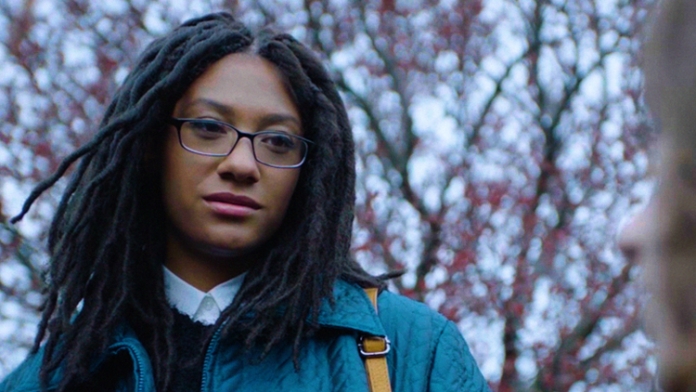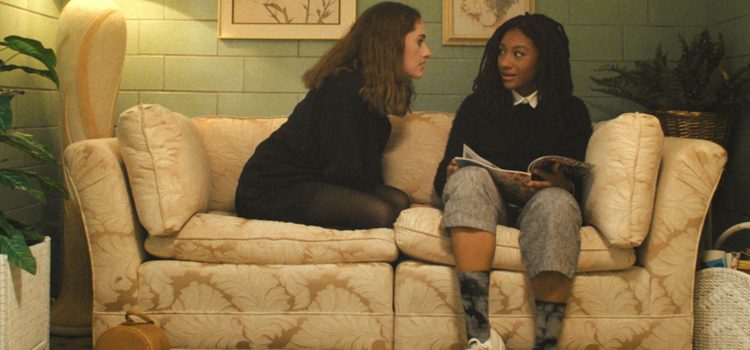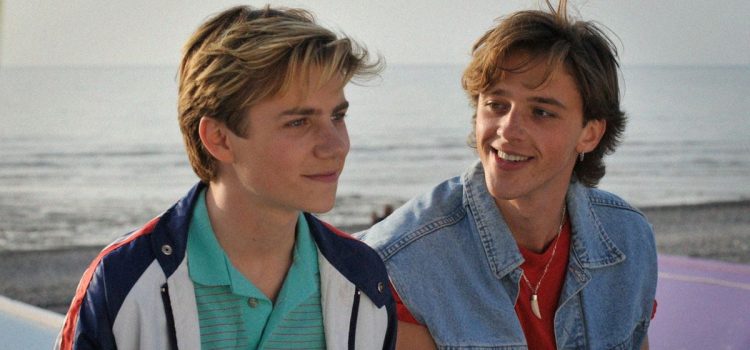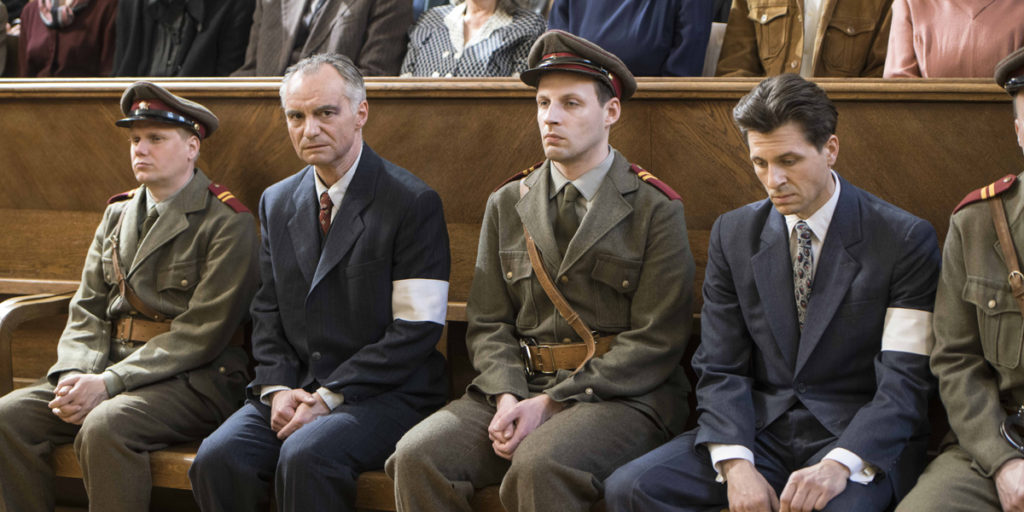By Alex McPherson
Olivia Peace’s directorial debut, “Tahara,” provides an incisive look at identity, grief, and societal pressures.
Unfolding during a single day within a Jewish synagogue, the film centers on best friends Carrie Lowstein (Madeline Grey DeFreece) and Hannah Rosen (Rachel Sennott) as they attend the funeral services for their Hebrew school classmate, Samantha Goldstein, who was shunned by her community for her queerness. Carrie, a soft-spoken Black woman, quickly realizes the hypocrisy on display from her peers and instructors, especially during the “Teen Talk-back” session in which she and her classmates are forced to discuss faith in relation to Samantha’s death. They are enacting a performative ritual that contradicts how many of them treated Samantha while she was alive.
Everyone besides Carrie is seemingly driven by selfish interests, especially Hannah — an impulsive, reckless individual. Hannah is solely focused on attracting the attention of pretty boy Tristan Leibowitz (Daniel Taveras), rather than on grieving the loss of her classmate. After she coerces Carrie into “practicing” her kissing skills, Carrie’s true feelings for her come to the forefront. Hannah is forced to confront her own insecurities, and Carrie must navigate the troubled waters of their friendship.
Although the topics broached don’t break the mold for the coming-of-age genre, “Tahara” makes a positive impression from its opening frames and remains compelling throughout.
The film’s distinctive style is apparent from the get-go — utilizing a 1:1 aspect ratio that creates a confined atmosphere, enhanced through frequent long takes. Additionally, when the characters experience a euphoric moment, the picture widens to fill the entire screen. During the aforementioned kiss, for example, colors whirl from all directions while Carrie and Hannah become smooching claymation figures — briefly existing on a different plane of existence, only to return to the restrictive norm immediately after.
Indeed, the whole film revolves around Carrie and Hannah’s relationship, as their bond is put to the test. Carrie’s mild-mannered personality sharply contrasts with Hannah’s, but “Tahara” effectively conveys their years of friendship through dialogue that, while often sardonic, feels authentic. DeFreece gives a particularly noteworthy performance as an individual facing challenges from multiple angles who eventually recognizes the importance of asserting herself.
While Carrie remains sympathetic, Hannah is practically unbearable. Her self-absorption makes her difficult to watch at times, and her stubborn resistance to change proves incredibly frustrating. Sennott’s masterful performance, though, renders Hannah more complicated than she initially seems — an individual deeply unsure of her future and grappling with the person she wants to become. Although the film’s condensed time-frame limits how much we can learn about Carrie and Hannah individually, “Tahara” does a commendable job at illustrating their tensions, rendering each deeply human.
Overlooking a few exaggerated side characters, Peace’s film successfully peels back the layers of its subjects’ cynicism to reveal a tragic, at times heartbreaking situation with young adults weighed down by external expectations. Religion, mourning, regret, self discovery, social status, and toxic friendships are all explored to various extents in this microcosm of teenage uncertainty.
Despite some jokes that fail to land and occasionally heavy-handed symbolism, “Tahara” remains engaging from beginning to end. I wish Peace’s film wasn’t limited to showing a single day in the life of these characters, however, as the conclusion remains frustratingly open-ended and fails to give one specific character the resolution they deserve. The film’s initially comedic bent gives way to straight-up drama by the end credits, not shying away from ambiguity and leaving the future unpredictable.
Multifaceted and surprisingly ambitious, “Tahara” is a coming-of-age film worth experiencing, as well as an impressive calling card for director Peace.

“Tahara” is a 2020 movie directed by Olivia Peace that runs 78 minutes. It is a narrative feature selected for Cinema St Louis’ annual QFest, which will take place virtually April 16-25. For ticket information and festival offerings, visit www.cinemastlouis.com/qfest. Alex’s rating: B+

Lynn (Zipfel) Venhaus has had a continuous byline in St. Louis metro region publications since 1978. She writes features and news for Belleville News-Democrat and contributes to St. Louis magazine and other publications.
She is a Rotten Tomatoes-approved film critic, currently reviews films for Webster-Kirkwood Times and KTRS Radio, covers entertainment for PopLifeSTL.com and co-hosts podcast PopLifeSTL.com…Presents.
She is a member of Critics Choice Association, where she serves on the women’s and marketing committees; Alliance of Women Film Journalists; and on the board of the St. Louis Film Critics Association. She is a founding and board member of the St. Louis Theater Circle.
She is retired from teaching journalism/media as an adjunct college instructor.




